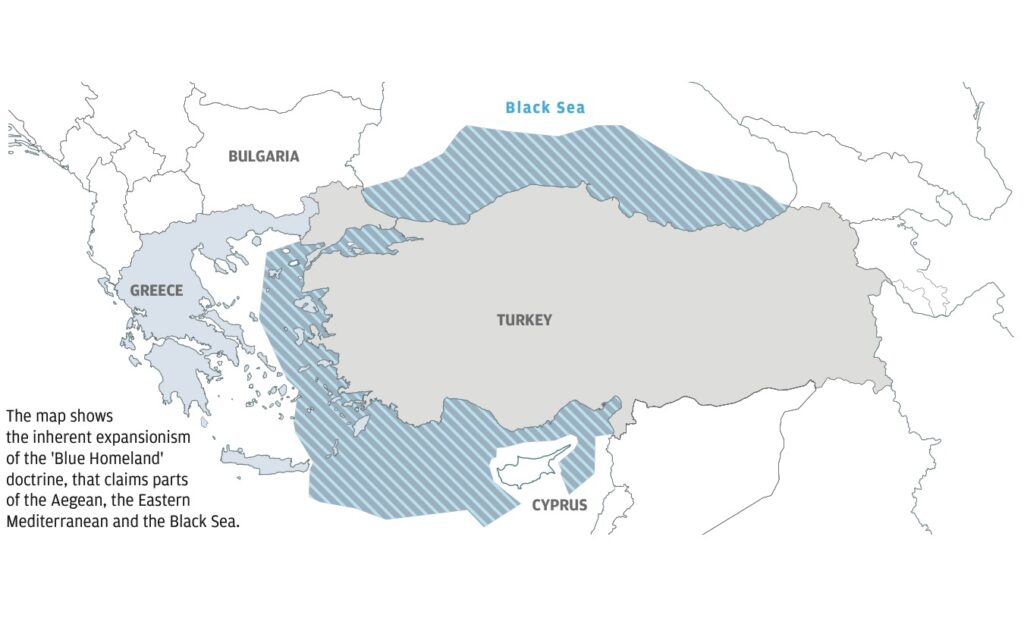A cable-laying ship lies at the centre of the latest tension between Turkey and Greece. Last week, Turkey issued two Navigational Telexes (NAVTEX) regarding the activities of the Italian-registered C/S Teliri within its continental shelf area, located between the islands of Rhodes and Crete.
The directive issued by the Turkish state concerns a sea area which is included in the illegal Turkey-Libya memorandum and Turkey’s new doctrine of the “Blue Homeland.”

The move effectively claims that the work area is part of the Turkish continental shelf while disputing Greek sovereignty over its island shores.
Turkey had unilaterally and arbitrarily declared this area to the UN as a Turkish Exclusive Economic Zone (EEZ).
Despite this development, there has been no official statement from Turkish or Greek authorities regarding the NAVTEX.
The move comes amid recent efforts to thaw relations between the Aegean neighbours, who have a history marked by conflicts. NAVTEX, a maritime communication system, allows ships to communicate their presence and other relevant information in specific areas.
According to Turkish newspaper Milliyet, Greece and the Republic of Cyprus have attempted to breach Turkey’s continental shelf over ten times recently, but Turkish military and diplomatic efforts have prevented these actions.
C/S Teliri is laying cables undersea as part of an agreement involving Egypt, Israel, the Republic of Cyprus, and Greece. A day before Turkey’s NAVTEX on June 24, the Greek Cypriots issued their own telex regarding the vessel’s work area. Turkey responded with another NAVTEX, dismissing the Cypriot’s telex as unauthorized and asserting the area’s inclusion within Turkey’s continental shelf.
The telex labelled the Greek Cypriot action as an attempt to legitimize illegitimate claims, asserting Turkey’s refusal to recognize them. The second NAVTEX provided coordinates of the vessel’s location, reaffirming it was operating within Turkish waters.
Turkey rejects Greece and the Republic of Cyprus maritime boundary claims, arguing they violate Turkey’s and Turkish Cypriots’ sovereign rights. Greece, which possesses the longest continental coastline in the Eastern Mediterranean, and the rest of the international community do not acknowledge the Turkish Republic of Northern Cyprus (TRNC) on the island.
Tensions over these disputed waters resurfaced when Greece announced plans to establish two marine parks in the Aegean and Ionian Seas by 2024, despite Turkish objections.
The creation of the Aegean Park has particularly angered Turkey, which accuses Athens of exploiting environmental concerns for geopolitical purposes. Greece’s Foreign Ministry counters that Turkey is politicizing an environmental issue. Despite being NATO allies, Turkey and Greece have clashed for decades over territorial disputes in the Aegean. A Turkish official indicated that Turkey may establish its own marine parks in retaliation, citing Greece’s failure to consult on the matter and its unilateral actions.
Despite recent efforts to normalize relations, including landmark visits by President Recep Tayyip Erdoğan to Athens and Greek Prime Minister Kyriakos Mitsotakis to Turkey, challenges remain. Both leaders have expressed commitment to dialogue and enhancing bilateral ties, as outlined in the Athens Declaration on Friendly Relations and Good-Neighborliness.
Nevertheless, longstanding issues persist, rooted deeply in historical grievances, particularly in the Aegean, where military tensions have been a recurrent issue. Greece’s purchase of F-35 fighter jets from the U.S. and the upping of defence budgets are meant to counter the protection of Turkish interests in the Eastern Mediterranean. Greece says it needs to defend the islands against a potential attack from Turkey.
Erdoğan stressed that there are no insurmountable issues between the two nations, underscoring the dedication to settling disputes via dialogue, fostering good neighbourly relations, and complying with international law.

